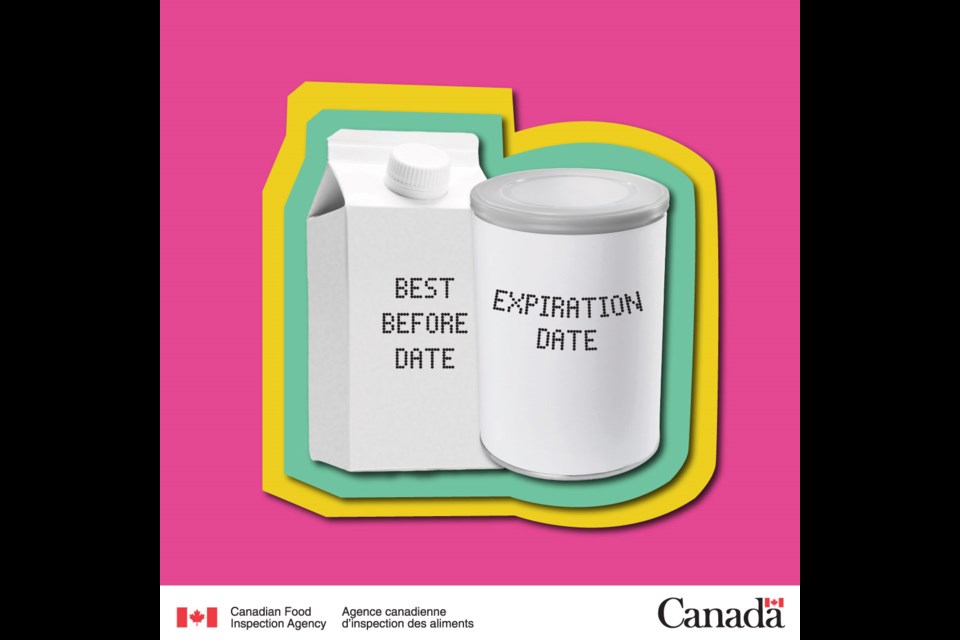Understanding food product labels can help make informed decisions about dietary choices and what to purchase or consume. To help consumers make better dietary decisions, the Canadian Food Inspection Agency has provided public information about food package labelling.
Best before dates
Best before dates are about quality, not safety. The purpose of a best before date is to tell how long a properly stored, unopened food product will retain its freshness, taste, nutritional value, and any other qualities claimed by the manufacturer.
The best before date is not the same as an expiration date. They provide information about the freshness and potential shelf-life of the food product being sold. For instance, stale cereal is still safe to eat, even if the best before date has passed, granted safe food storage practices have been followed.
If any signs of spoilage are found, the food shouldn’t be eaten regardless of the best before date.
Best before dates are generally required on food with a shelf life of 90 days or less. Product labels on these items must contain either a best before date or a packaged-on date, depending on where it was packaged and sold.
Food products with a shelf life of 90 days or greater are considered “shelf stable” and do not require a best before label, although most manufacturers and retailers choose to add one. These items include many canned goods, dry food like pasta, and food sold in a frozen state.
Although it’s illegal to modify a product label, it is legal to sell a product past its best before date. If stored properly following the instructions on the label, these products will simply lose some nutritional value, or their original texture may change. One example is juice products that may contain a lower Vitamin C content beyond this date.
“(With) the best before date, it’s really important to remember that they only apply to unopened packages. Once you open the package, it’s really important to store the food according to how the manufacturers want you to store it,” explained Dr. Sandeep Tamber, a research scientist with Health Canada.
“It’s also important to know that once you open the package the quality of the food is degrading, so you should try to eat that food as soon as you can. That’s a really good way to reduce food waste.”
Here are a few examples of how long certain food products can be consumed past the best before date:
- Canned goods: up to one year
- Dairy and eggs: up to two weeks if kept in the fridge
- Frozen meat: up to one year if kept in the freezer
- Dry cereals: up to one year
- Packaged snacks including granola bars: up to one year
- Unopened, shelf-stable condiments: up to one year
- Unopened drinks including juice or coconut water: up to one year
- An opened bottle of ketchup in the fridge: up to six months
*These are only intended as approximations and apply to food stored under ideal conditions.
Expiration dates
An expiration date is different from a best before date.
Food products that are past their expiration date should not be eaten and are illegal to sell. This is because they come with strict compositional and nutritional specifications that cannot be guaranteed beyond this date.
Expiration dates must be used on:
- Formulated liquid diets, which are nutritionally complete diets for people using feeding tubes
- Foods represented for use in a very low-energy diet and sold by pharmacists
- Meal replacements
- Nutritional supplements
- Human milk substitutes, including infant formula
These are “foods that people require to take in for all of their caloric intake, (and) for all of their nutritional intake.”
“Expiration dates are required on those types of foods because once that date is passed, the food is degrading in terms of its nutritional content and it’s not safe to eat,” Dr. Tamber confirmed.
If you witness food being sold past its expiration date, you can report to the Canadian Food Inspection Agency.
Packaged on dates
Packaged on dates are like best before dates but are used on foods packaged at retail with a shelf life of 90 days or less. These products need durable life information on the label or an adjacent poster. The information tells the anticipated amount of time an unopened food product will retain its quality and freshness.
The government enacts these regulations through Health Canada, who sets the standards for the safety and nutritional quality of food sold in Canada. This is enforced by the Canadian Food Inspection Agency.
For more information, visit Inspection.Canada.ca. The Canadian Food Inspection Agency can be reached toll-free at 1-800-442-2342.




